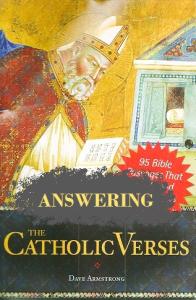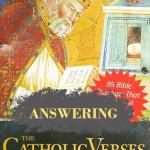Including: How Far Away Were the Cities that the Jerusalem Council Bound to its Decrees?
[see book and purchase information for The Catholic Verses]
“excatholic4christ” (Tom) was raised Catholic, lost his faith in high school, attended Mass for a while after he married and had children, and then “accepted Jesus Christ” as his Savior, leading to his sole attendance at an independent fundamental Baptist church for eight years. He claims that the “legalism” of this church and the fact that his “trust had been in men rather than God” caused him to “walk away from the Lord for 23 years.” He “returned to the Lord” in 2014. As of April 2020, Tom stated that he was “somewhere in the middle of the Calvinism-Arminianism debate,” but “closer to Calvinism.” I couldn’t determine his denomination. See Tom’s index of all of his replies. I will now systematically refute them. His words will be in blue. When he cites my words, they will be in black. I use RSV, unless otherwise specified.
*****
This is a reply to Tom’s article, The Catholic Magisterium’s Authoritative Interpretation of Scripture? (9-17-18)
Citing the three passages below, Armstrong argues for the validity and necessity of Catholicism’s claim to absolute authority in the interpretation of Scripture:
Nehemiah 8:8 “So they read from the book, from the law of God, with interpretation. They gave the sense, so that the people understood the reading.”
Acts 8:27-31 “So he got up and went. Now there was an Ethiopian eunuch, a court official of the Candace, queen of the Ethiopians, in charge of her entire treasury. He had come to Jerusalem to worship and was returning home; seated in his chariot, he was reading the prophet Isaiah. Then the Spirit said to Philip, “Go over to this chariot and join it.” So Philip ran up to it and heard him reading the prophet Isaiah. He asked, “Do you understand what you are reading?” He replied, “How can I, unless someone guides me?” And he invited Philip to get in and sit beside him.”
2 Peter 1:20 “First of all you must understand this, that no prophecy of scripture is a matter of one’s own interpretation.”
Directly beneath the three verses, Armstrong writes, “Catholics hold that Scripture is a fairly clear document and able to be understood by the average reader, but also that the Church is needed to provide a doctrinal norm, an overall framework for determining proper biblical interpretation.” p. 32.
Catholicism claims that its magisterium (i.e., the teaching office of the pope and his bishops) alone is divinely authorized to interpret Scripture.
It’s not like we demand one interpretation of every verse in the Bible. In fact, the Church has only authoritatively declared the meaning of a mere seven (or possibly nine) passages. That’s it! The Church, however, is the guardian and determiner of the orthodoxy of doctrines.
For multiple centuries, the church withheld the Bible from the laity
There are all sorts of myths surrounding this. See my papers:
Were Vernacular Bibles Unknown Before Luther? (Luther’s Dubious Claims About the Supposed Utter Obscurity of the Bible Before His Translation) [6-15-11]
Dialogue: “Obscure” Bible Before Luther’s Translation? [7-24-14]
Catholic Church: Historic “Enemy” of the Bible? [9-11-15]
Does the Catholic Church Think it is Superior to the Bible? [9-14-15]
Was the Catholic Church Historically an Enemy of the Bible? [National Catholic Register, 3-27-17]
Did Luther Rescue the Bible in German from Utter Obscurity? [National Catholic Register, 10-30-17]
Did Medieval Catholicism Forbid All Vernacular Bibles? [5-11-21]
Council of Trent: Anti-Bible or Anti-Bad Bible Translations? [5-12-21]
No, Pope Innocent III Did Not Prohibit the Bible in 1199 [National Catholic Register, 8-2-21]
Catholic Church “Above” the Bible? (vs. Lucas Banzoli) [5-25-22]
Banzoli’s “Church vs. the Bible” Myths Debunked [6-2-22]
“Church vs. the Bible” (vs. Francisco Tourinho) (Examining the Presuppositions That Lie Behind Past Catholic Recommended Restrictions on Individual Bible Reading) [6-5-22]
and, even now, does not strongly encourage individual Bible study.
This is also a myth. It certainly does do so. Ven. Pope Pius XII wrote in his 1943 papal encyclical, Divino Afflante Spiritu:
Nor is it forbidden by the decree of the Council of Trent to make translations into the vulgar tongue, even directly from the original texts themselves . . .
Being thoroughly prepared by the knowledge of the ancient languages and by the aids afforded by the art of criticism, let the Catholic exegete undertake the task, of all those imposed on him the greatest, that, namely of discovering and expounding the genuine meaning of the Sacred Books. In the performance of this task let the interpreters bear in mind that their foremost and greatest endeavor should be to discern and define clearly that sense of the biblical words which is called literal. (sections 22, end, and 23, beginning)
Likewise, Vatican II, Constitution on Divine Revelation (Dei Verbum):
Access to sacred Scripture ought to be wide open to the Christian faithful . . . the Church, with motherly concern, sees to it that suitable and correct translations are made into various languages, especially from the original texts of the sacred books. If it should happen that . . . these translations are made in a joint effort with the separated brethren, they may be used by all Christians. (ch. 6, sec. 22)
Now, whether most Catholics follow the advice of the Church is another question entirely. Catholics are — broadly speaking, and for various reasons — quite ignorant of the Bible. I’ve written about it many times. But this isn’t worse than Protestant ignorance of Church history and sacred tradition, and the competing interpretations among Protestants, who are indeed more familiar with the Bible. Of what advantage is that, however, if they can’t agree on what it teaches in so many areas? Espousal of actual doctrinal error is far worse than mere ignorance. But ignorance and nominalism are always widespread (in any Christian environment), and I have made it my life’s work to combat it among Christians.
In contrast, God’s Word exhorts us to “Do your best to present yourself to God as one approved, a worker who has no need to be ashamed, rightly handling the word of truth” (2 Timothy 2:15). God’s Word also holds up as an example the believers in the city of Berea of northern Greece who “received the word with all eagerness, examining the Scriptures daily to see if these things were so” (Acts 17:11).
Amen! We heartily agree. Nothing is more filled with Scripture than papal encyclicals or Vatican II documents, or the Catechism. Each individual Christian is responsible to read and know and apply biblical teachings. Most fall short. In other words, it’s not just a “Catholic problem.” It’s a virtually universal education and ignorance problem. Generally, when I debate Protestants (including Tom) I offer, five or even ten times or more Bile verses in favor of my view than they give for theirs. Protestants strongly tend to ignore passages other than carefully selected ones that they are spoon-fed (which appear at first glance to support their views), whereas Catholicism takes into account all of Scripture, and considers all of it important and there for a reason, as an inspired revelation from God to us. That was one reason why I wrote the book that Tom is vainly trying to refute.
Nowhere in the Bible do we see anything resembling a dictatorial teaching office as we see with the Vatican hierarchy.
Tom slanders it as “dictatorial.” That isn’t our view. The Church is our Mother and Guide to the faith. We’re not forced to submit to it; we willingly do so, with the belief that God guides His Church and protects her from error. We do see — contrary to Tom’s denial — authoritative Church teaching in the Jerusalem council, which even appealed to the Holy Spirit:
Acts 15:28-29 For it has seemed good to the Holy Spirit and to us to lay upon you no greater burden than these necessary things: [29] that you abstain from what has been sacrificed to idols and from blood and from what is strangled and from unchastity. If you keep yourselves from these, you will do well. Farewell.
This was not merely a local church scuffle. The apostles Paul, Peter, and James were all there. The authoritative, binding letter was sent to “the brethren who are of the Gentiles in Antioch and Syria and Cilicia.” Damascus, Syria was 155 miles from Jerusalem. That was a very long distance in those days. Antioch was a city in the middle (from an east-west perspective) of present-day Turkey, on its southern border (right next to present-day Syria). Antakya is the current Turkish city in the region. It’s 453 miles from Jerusalem. Yet here was the church in Jerusalem sending it binding instructions, claimed to be agreed with by the Holy Spirit. Cilicia was the region of southern Turkey extending quite a ways west from Antioch. So it was at least 453 miles from Jerusalem, and most of it many more miles away.
Moreover, Paul and Timothy “went on their way through the cities,” and “they delivered to them for observance the decisions which had been reached by the apostles and elders who were at Jerusalem” (Acts 16:4). What cities or areas were these? Well, in the immediate context, Phrygia, Galatia, Bithynia, Troas, and Macedonia are mentioned as places that were visited by Paul and Timothy, and where they delivered the letter decided at Jerusalem by “apostles and elders” (Acts 16:6-10). Now let’s do some more ancient geography, to see how far these places were from Jerusalem:
Phrygia was in west and central Turkey (then known as Anatolia or Asia Minor). At the western end of Phrygia was the town of Aizanoi (modern Çavdarhisar). That’s 991 miles away. But it wasn’t too far for the church in Jerusalem to send it binding decrees (what Tom ignorantly describes as a “dictatorial teaching office”). Galatia was just northeast of Phrygia, and thus almost as far as that location. Bithynia was north and a little west of Phrygia, and so even further from Jerusalem (more than a thousand miles away). Troas (also known as “The Troad”) was in the western part of Anatolia, and so further than any area mentioned yet. Lastly, Macedonia shortly after apostolic times was north of current-day Greece in the area of the former Yugoslavia (now again called the Republic of Macedonia). But it was larger than that and extended quite a bit into what is now Greece. It included the city of Thessaloniki (Paul wrote two letters to the Christians there), which still exists, and is, by land, no less than 1501 miles from Jerusalem.
Clearly, the Jerusalem council regarded itself as authoritative over Gentile Christians everywhere (and they were, of course, the vast majority of the rapidly accumulating body of Christians). The cities that Paul delivered this letter to (Acts 16:4) ranged from 991 to 1500 miles, as just shown. If that is not very much like the Vatican and Catholicism issuing doctrines that are binding in very large geographical areas, I don’t know what is. And it’s right in inspired Scripture. Let Tom deal with it! But so far he has ignored my first five critiques, which he was informed of before he banned me from commenting on his blog. What else is new with anti-Catholics? I was always banned in their venues: if not immediately, then as soon as I made any arguments there.
As the bishops of Rome consolidated their power and authority, the church became increasingly institutionalized and untethered from God’s Word.
As the founders and inventors of Protestantism consolidated their power and authority, their competing sects became increasingly relativized and chaotic and untethered from God’s Word (since, after all, their endless contradictions necessarily entailed much doctrinal error and conflict with the Bible).
The magisterium that claimed to defend orthodoxy had in reality suppressed and abandoned Scriptural truths in favor of its many man-made traditions.
Once again he makes a claim with no substance: Tom’s stock-in-trade. My blog and books are dedicated to showing that this is not the case, all down the line.
The Reformers of the 16th century were able to return the church in part to the simple Gospel of salvation by God’s grace through faith in Jesus Christ alone and to the sole authority of Scripture. While the Reformers did not agree on every single theological detail, they were united in the Gospel of grace. The same is true among genuine believers today. How can believers in different countries and cultures all over the world be united in the Gospel without a central authority? It’s an amazing thing to behold. The Holy Spirit divinely unites and guides believers through the Gospel of Jesus Christ and through His Holy Word.
The nature of the gospel was not at issue, as I have already addressed. Catholics agree on grace alone and Christ alone because they are biblical concepts. Scripture doesn’t teach that it is the sole authority. The example of the Jerusalem Council above proves that; and there are many other biblical proofs, too.
Armstrong is aware that the majority of his readers are not familiar with church history and is therefore confident that his arguments for Catholicism’s authority will appear logical.
They’re certainly more aware of it than the average Protestant. But my job is to educate, in any event. One can’t educate people who already know what you are about to teach them.
But even a casual student of church history knows popes and church councils have been in conflict.
If Tom would ever actually produce specific concrete examples of his sweeping claims, then we could have a discussion about it. As it is, there is no way to discuss a statement like the above; only to deny it, as I do now. There was never any conflict on doctrines that Catholics are bound to accept.
Armstrong points to the church’s magisterium as its guiding authority, but the magisterium has proven itself to be totally unreliable again and again. Dogmas have been defined that are un-Biblical and even anti-Biblical. By placing themselves above Scripture, the popes and their bishops were able to create man-made tradition upon man-made tradition.
See my previous reply.
. . . we see that Catholicism has instead supplanted Scripture with its false gospel of salvation by sacramental grace and merit and by its anti-Biblical traditions.
No biblical arguments are provided. This is exceedingly weak argumentation; in fact, rarely any argument at all. Tom simply repeats anti-Catholic playbook polemics. For my part, I produce more than 200 biblical passages supporting the biblical gospel of faith which inherently includes works within itself, and against the false doctrine of “faith alone.”
Believers cry, “Sola Scriptura,” Scripture alone guides us, while Catholics, in substance, cry, “Sola Ecclesia,” their church leadership alone truly guides them.
This is untrue as well. First of all, we are believers, too. Secondly, we don’t believe in Church Alone. We believe in a rule of faith that consists of Bible, Church, and Tradition: all in complete harmony with each other, which includes Church and Tradition being in complete accord with the Bible. If Tom would stop misrepresenting what we believe, and read and interact with my replies, perhaps he would learn what we actually believe, and stop warring against a straw man.
*
*****
*
*
Summary: Anti-Catholic Tom just doesn’t understand the Catholic rule of faith and our method of interpreting Scripture. I explain the biblical parallel of Catholic authority.














